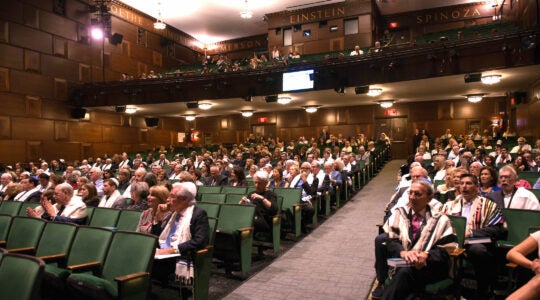Engaging with three Pulitzer Prize-winning journalists at Jewish Week-sponsored programs in the span of five days this past week left me inspired by their professionalism, passion and commitment. It also left me deeply worried for the future of serious journalism in this country — and, by extension, our democratic institutions.
On Sunday evening, Clyde Haberman, whose long and distinguished career at The New York Times included several stints as a foreign correspondent in Jerusalem, and his daughter, Maggie Haberman, the high-profile White House correspondent President Trump seems to love and hate, spoke openly at Congregation B’nai Jeshurun about the professional and personal challenges in their careers. More than 400 people attended the event, which I moderated, and heard father and daughter warn that when the president calls journalists “the enemy of the people” and derides their work as “fake news,” the result is an erosion of national discourse. And that poses a threat to democracy.
Clyde was both foreign correspondent and city reporter, editor and columnist during his almost four decades at The Times and was part of the team of reporters who won a Pulitzer Prize in 2009 for coverage of the Eliot Spitzer sex scandal.
Daughter Maggie, who came to The Times in 2015 to cover the presidential campaign, is part of the team that won a Pulitzer this year for reporting on the president’s advisers and their connections to Russia. Her byline has become a staple of Page One coverage for the last two years.
The Haberman’s implicit message, based on their dogged dedication to “get the story right,” is that a free society needs a free press, and that journalists have a vital responsibility to use their own moral judgment.
That’s the same message New York Times columnist Bret Stephens made last Wednesday evening — in the context of Middle East reporting — when he addressed The Jewish Week’s Write On For Israel commencement ceremony at the Hebrew Union College-Jewish Institute of Religion.
Stephens, who won the Pulitzer Prize for commentary in 2013 when he was at the Wall Street Journal, spoke to the 45 high school graduates of the two-year Write On program, which seeks to provide students with the knowledge and confidence to speak up for Israel when they get to campus.
He said he became a supporter of Israel not because of his conservative political beliefs or the tragedy of the Holocaust. “I came to my views on the Israel-Palestinian conflict as a journalist trying to do my job,” he said, when, in 2000, he spent a few weeks in the Palestinian territories. His assignment was to talk to people about what they felt a Palestinian state would be like. What he heard was that Yasir Arafat was a dictator who stole from his people, and that most Palestinians didn’t believe Israel had a right to statehood.
Those sentiments ran contrary to the prevalent narrative that Arafat wanted peace, but Stephens came to the conclusion that “everything I read in the press was wrong.”
He told the students that “the most effective form of advocacy begins with seeing the truth and reporting it. Look for the facts and you’ll find that Israel stands up pretty well on its own [merits].”
Stephens asserted that those who believe Israel can do no wrong will soon be disillusioned. “It’s a country led by fallible people, but it’s the only country in the Middle East where its leaders can be sentenced for a crime.” Former President Moshe Katsav served five years in prison for a rape conviction, and former Prime Minister Ehud Olmert was jailed for 16 months for fraud and bribery.
Don’t judge Israel as a country of saints, he said, and hold Palestinians to the same moral standards.
Addressing the issue of free speech on campus, Stephens said that Israel’s adversaries “want to take free speech down,” but advised: “Don’t copy their behavior. Win the argument; don’t try to shut them down.”
He described Israel as “a magical, mysterious place where people seem to be blessed with a sense of purpose,” and he reminded the students that in contrast to our current American culture, Judaism places the collective over the personal. “We are the children of Moses,” he said, “with a unique heritage of moral leadership.”
At the Sunday evening program, Clyde Haberman spoke of the emotional toll for a caring Jew assigned to report on Israel for “the paper of record.” Though at times bemused, he also sounded bruised from the blunt criticism he received during his stint as Jerusalem-based correspondent in the early 1990s. He characterized his Israel assignment as “the only one ever in which in four years I never got a compliment or positive note for my coverage.”
And American Jews on the right were toughest on him, he said, often calling him, in print or to his face, a self-hating Jew.
He told the B’nai Jeshurun audience such remarks were hurtful but did not shake his strong sense of Jewish identity. And he praised his daughter for her steely resolve in the face of criticism, including disparaging tweets from the president. Trump has called her “a third-rate reporter … known as a Crooked H[illary] flunky who I don’t speak to and have nothing to do with.”
Maggie Haberman seems nonplussed by such remarks, noting that she speaks with him frequently. And in pointing out in her reporting that the president lies, she said: “Trump believes reality is what he tells you it is. He doesn’t deal in facts or even believe in facts. He is changing the presidency,” she added, concerned that the bar may be lowered after his tenure as well.
Responding to criticism that The Times is pursuing Trump too aggressively, even in its news pages, both Habermans pointed out that Trump is under investigation for obstruction of justice and collusion with the Russians.
Maggie acknowledged discomfort with being cast as a celebrity, most recently as a result of a four-part documentary series airing on Showtime, “The Fourth Estate,” focusing on The Times’ coverage of Trump in his first year in office. She is one of the handful of reporters and editors tracked closely by the camera crew, which includes a phone interview she had with the president, initiated by him, after the collapse of his Obamacare repeal effort.
She said she hopes the takeaway for viewers of the series is that The Times takes its role most seriously and is doing its best to ferret out the truth. And she believes the mainstream media should pay more attention to “day-to-day stories” that indicate an erosion of democracy rather than focusing so much on the Russia investigation and the midterm elections. “On lots of issues, there needs to be more sunlight,” she said.
Her father said he worries that the distortion of the truth threatens our democratic way of life. “People feel entitled to their own facts,” he said. “When there’s no countervailing reality, we’re in trouble.”
As for Trump calling The Times “the failing New York Times,” Clyde said, “It ain’t failing. I’m reminded of the Elaine Stritch song, ‘I’m Still Here.’ We’re still here.”
The New York Jewish Week brings you the stories behind the headlines, keeping you connected to Jewish life in New York. Help sustain the reporting you trust by donating today.




